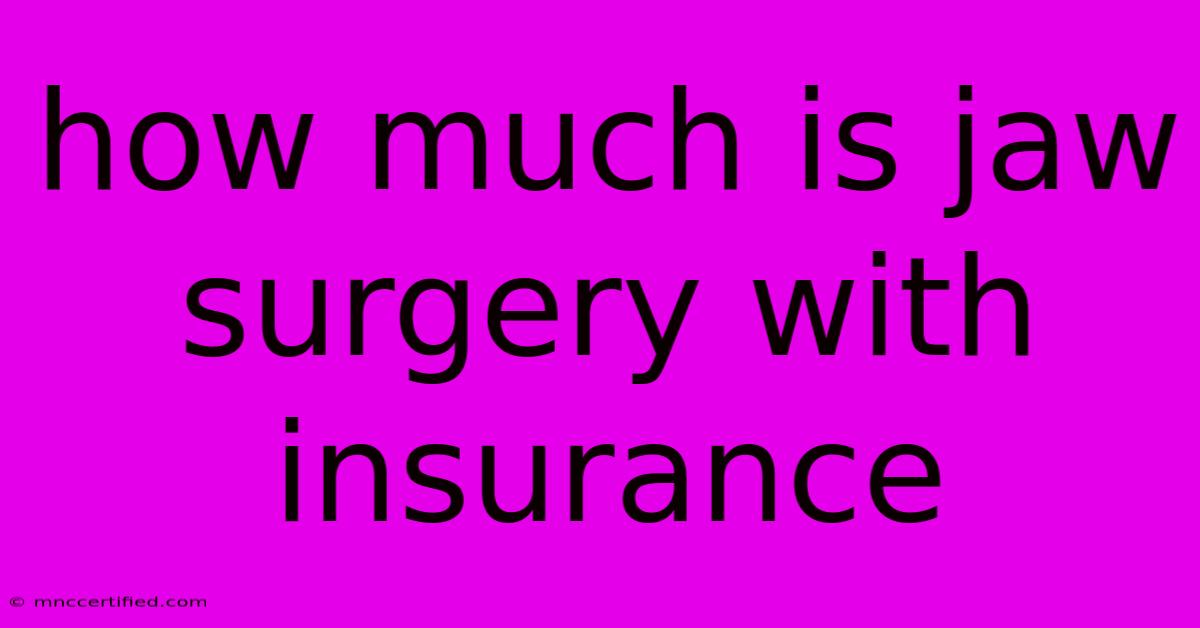How Much Is Jaw Surgery With Insurance

Table of Contents
How Much Does Jaw Surgery Cost With Insurance? A Comprehensive Guide
Jaw surgery, also known as orthognathic surgery, can dramatically improve your oral health, facial aesthetics, and overall well-being. However, the cost of this procedure can be significant, making it crucial to understand how insurance coverage can impact your financial responsibility. This guide will break down the factors influencing jaw surgery costs, explore insurance coverage options, and provide tips for managing expenses.
What Factors Determine Jaw Surgery Cost?
The cost of jaw surgery can vary widely based on several factors:
- Complexity of the Procedure: The extent of bone repositioning, the number of bones involved, and the techniques employed all contribute to the overall cost.
- Location and Surgeon Expertise: The geographical location and the surgeon's experience and reputation can significantly impact pricing.
- Anesthesia and Hospital Fees: These costs are also factored in, as they vary depending on the chosen facility and duration of the procedure.
- Pre- and Post-Surgical Care: Additional expenses may include consultations, diagnostic tests, medications, and post-operative therapy.
Understanding Insurance Coverage for Jaw Surgery
While jaw surgery may seem expensive, many insurance plans cover at least a portion of the costs. Here's what you need to know:
- Pre-authorization: Most insurance companies require pre-authorization before any surgery, ensuring the procedure is medically necessary and meets their coverage criteria.
- Benefits and Deductibles: Your insurance plan will have a specific deductible you must pay before coverage kicks in, along with copayments or coinsurance for each service received.
- Covered Services: Typically, insurance plans cover medically necessary jaw surgery, including procedures addressing:
- Malocclusion: Severe bite problems affecting chewing, speech, and jaw function.
- Sleep Apnea: Obstructive sleep apnea caused by anatomical jaw abnormalities.
- TMJ Disorders: Temporomandibular joint disorders affecting jaw movement and function.
- Cosmetic Procedures: Insurance coverage for cosmetic procedures, such as jawline reshaping for purely aesthetic purposes, is generally limited.
Tips for Managing Jaw Surgery Costs:
- Explore Your Insurance Options: Thoroughly understand your insurance plan's coverage for jaw surgery, including pre-existing conditions, limitations, and out-of-pocket expenses.
- Consult with Your Surgeon: Discuss your financial concerns with your surgeon. They can advise on cost-effective options and assist with exploring financing alternatives.
- Consider a Payment Plan: Many surgeons offer payment plans or financing options to help manage the costs of surgery.
- Explore Grants and Funding: Organizations like the American Academy of Facial Plastic and Reconstructive Surgery may offer grants or scholarships for eligible candidates.
Conclusion
While jaw surgery can have significant costs, understanding insurance coverage and exploring available financial options can help manage the expenses. Remember, prioritizing your oral health and overall well-being is crucial. Consulting with your dentist and surgeon to discuss your options and develop a comprehensive plan is essential.

Thank you for visiting our website wich cover about How Much Is Jaw Surgery With Insurance. We hope the information provided has been useful to you. Feel free to contact us if you have any questions or need further assistance. See you next time and dont miss to bookmark.
Featured Posts
-
Employee Benefits Insurance Fort Myers
Nov 09, 2024
-
Grammys Beyonce Swift Extend Legacy
Nov 09, 2024
-
Aldi Cheese Recall Latest Updates And Info
Nov 09, 2024
-
My Go To Charlotte Tilbury Glow Product
Nov 09, 2024
-
South Africa Ireland New Zealand Rugby Weekend
Nov 09, 2024